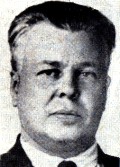Sergey Syrtsov was born in the family of a civil official. He received education at a commercial college and entered the St. Petersburg Polytechnic Institute. As a student, Syrtsov joined the Russian Social-Democratic Workers' Party (1913) and was expelled from the institute for revolutionary activities in 1916. Exiled to the Irkutsk Province, Syrtsov returned to Petrograd in 1917, where he worked on party assignments and later was sent to Rostov-na-Donu. In October 1917 Syrtsov was elected chairman of the Rostov-Nakhichevan Council and military revolutionary committee. From November 1917 to February 1918, he served as Chairman of the Don Provincial Military and Revolutionary Committee for fighting the White Cossacks. He led punitive expeditions against the Don Cossacks and supervised "decossackization". From April to 30 Sep 1918, Syrtsov was a deputy chairman of the Council of People's Commissars of the Don Soviet Republic; then he served as a member of the Don Bureau of the Russian Communist Party and military commissar of the 12th Army. In January-April 1919, Syrtsov was a chief for civil government department organized by the Revolutionary and Military Council of the South Front. He worked as a secretary of the Odessa Provincial Party Committee (1920-1921) and participated in the suppression of the Kronshtadt Rebellion (1921). Transferred to Moscow, Syrtsov supervised the work of one of the party Central Committee departments (1921-1926). Simultaneously, he edited the magazine Kommunisticheskaya revolyutsiya [from 1924]. The 13th party congress elected Syrtsov a candidate member of the Central Committee (31 May 1924 - 19 Dec 1927). In 1926 Syrtsov took the key post in Siberia as a secretary of the Siberian Regional Party Committee and the next year he earned another promotion as a full member of the Central Committee (19 Dec 1927 - 1 Dec 1930). On 18 May 1929, on the motion of Mikhail Kalinin, the All-Russian Central Executive Committee appointed Syrtsov as Chairman of the Council of People's Commissars of Russian SFSR on place of Aleksey Rykov. The committee plenum approved Syrtsov as a candidate member of the Politburo (21 Jun 1929 - 1 Dec 1930). However, Syrtsov joined the opponents of fast industrialization policy and authoritative rule of Iosif Stalin. On 3 Nov 1930, Syrtsov was relieved of functions of the Chairman of the RSFSR government. During the joint session of the Politburo and the Central Control Commission Presidium on 4 Nov 1930, Syrtsov openly confronted party leaders and declared that the Politburo works on the orders of Stalin instead of collective leadership. The party bodies severely criticized the "right leftist bloc of Syrtsov and Lominadze." On 1 Dec 1930, Syrtsov was expelled from the Politburo and the Central Committee by questionnaire approved by its members. From 1931 Syrtsov held a number of positions in state-owned enterprises - deputy chairman on the board of the Ekspoles Joint-Stock Company (wood exporting company), trust manager, and chemical plant director (the city of Elektrostal). Syrtsov was arrested on 19 Apr 1937, sentenced to death by the Military Board of the USSR Supreme Court on 10 Sep 1937 for "involvement in anti-Soviet terrorist organization" and executed the same day. Biography source: [3] |

